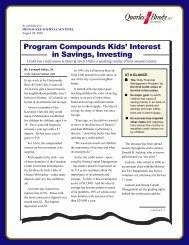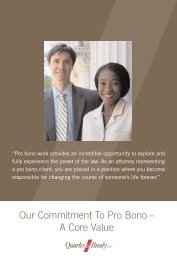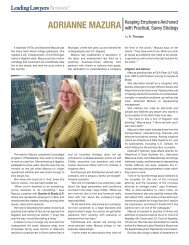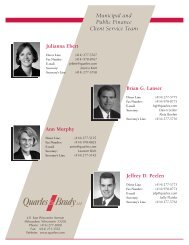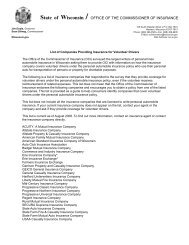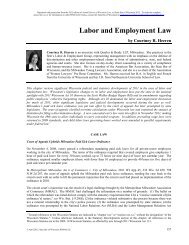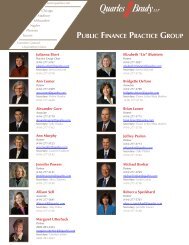JANICE RODGERS - Quarles & Brady LLP
JANICE RODGERS - Quarles & Brady LLP
JANICE RODGERS - Quarles & Brady LLP
You also want an ePaper? Increase the reach of your titles
YUMPU automatically turns print PDFs into web optimized ePapers that Google loves.
Janice E. Rodgers’ legal career took a hairpin<br />
turn when her children were young and she left<br />
an estate planning practice at a top Chicago<br />
firm to teach law part-time at Loyola University.<br />
Rodgers studied tax law at Harvard after<br />
becoming a CPA, so putting together the<br />
technical pieces of legal puzzles intrigued her.<br />
Rodgers’ first semester estate planning<br />
seminar at Loyola came naturally. Because<br />
she wanted to teach another class the next<br />
semester, Rodgers proposed and designed a<br />
charitable organizations course. She had been<br />
lucky enough to gain charitable giving<br />
experience in her law firm stint.<br />
“Then I was an expert because I had taught<br />
it,” she says with a laugh. Rodgers went on<br />
to join the law firm that represented the<br />
incipient John D. and Catherine T. MacArthur<br />
Foundation. The rest was history.<br />
The real fun of her practice at <strong>Quarles</strong> &<br />
<strong>Brady</strong> <strong>LLP</strong> is not just the technical challenges.<br />
It’s sharing indirectly in the creative<br />
philanthropy of private foundations and public<br />
charities. “I have very interesting, smart, and<br />
involved clients,” Rodgers says, “and while I’m<br />
a step removed from actually doing their work,<br />
I can help them accomplish it.”<br />
Rodgers, 58, leads <strong>Quarles</strong> & <strong>Brady</strong>’s taxexempt<br />
organizations team, one of the largest<br />
and most sophisticated of its kind in Chicago—<br />
and nationally. Three partners, three associates,<br />
and a paralegal exclusively handle matters for<br />
tax-exempts in Chicago, although more than<br />
SM<br />
<strong>JANICE</strong> <strong>RODGERS</strong><br />
15 lawyers across the firm have some strong<br />
nexus to the group. Among those are wellknown<br />
Leading Lawyers Network members<br />
Thomas E. Chomicz and John P. Vail. Vail also<br />
heads the firm’s investor services team.<br />
The clients of the tax-exempt organizations<br />
team come in all sizes. The tradition of <strong>Quarles</strong><br />
& <strong>Brady</strong> and its predecessor firms draws many<br />
large public charities and private foundations.<br />
But the team also represents startups and<br />
smaller organizations, often because of its pro<br />
bono commitment.<br />
“It’s also good experience to work with<br />
startups, even if they’re small and may not have<br />
much money,” Rodgers explains. Analyzing their<br />
legal issues can be complicated, whether it’s<br />
determining how they can become tax-exempt,<br />
judging if a good cause qualifies as being<br />
charitable under tax law, or finding ways to<br />
express legitimate charitable purposes clearly.<br />
Most of Rodgers’ clients are charitable<br />
entities or educational organizations. She<br />
represents the Chicago-based John D. and<br />
Catherine T. MacArthur Foundation, the<br />
Chicago-based Robert R. McCormick<br />
Foundation, the Oregon-based Lemelson<br />
Foundation, educational entities such as<br />
colleges and museums, and many others. Her<br />
firm counts other tax-exempt organizations<br />
among its clients including associations, social<br />
clubs and hospitals. Rodgers’ clients describe<br />
her as delightful and a great listener with a<br />
low-key but strong personality.<br />
Counseling Charities is the<br />
Foundation of Her Practice<br />
by Keith D. Picher<br />
What Tax-Exempts Need<br />
Although the Madoff scandal devastated<br />
many charities, the due diligence <strong>Quarles</strong> &<br />
<strong>Brady</strong>’s clients had in place prevented any<br />
major losses. Still, the economy has crimped<br />
endowments. The team addresses such issues,<br />
sets up new not-for-profit corporations,<br />
structures and restructures organizations, and<br />
assists clients with other legal needs in areas<br />
varying from real estate to intellectual property.<br />
Judgments involving the tax code and<br />
governance account for most of Rodgers’<br />
practice. Although Rodgers offers legal advice<br />
to individuals who donate to tax-exempt<br />
organizations, she represents entities more<br />
than 90 percent of the time. The legal issues<br />
are often the same, however. “It’s useful to<br />
have had the experience on both sides of an<br />
issue because it’s easier to see from the other<br />
side,” Rodgers says.<br />
For example, when Rodgers works with a<br />
donor, she can consider whether a gift would<br />
work for a charitable institution or whether it<br />
would tend to cause problems eventually.<br />
“What a restriction on a gift today will look like<br />
50 years from now comes up all the time for<br />
many of our clients,” she says.<br />
Many federal tax-related issues arise in her<br />
practice. Does an organization generate<br />
unrelated business income? Is the goal of the<br />
entity considered charitable? Can a grant or<br />
loan to a for-profit business be justified? Does a<br />
private foundation’s advocacy activity fall within<br />
an exception to the general ban on lobbying?<br />
Does a public charity’s grass-roots advocacy<br />
avoid a specific call to action? Do organizations<br />
aim to educate voters or do they engage in<br />
prohibited political campaign intervention?<br />
Making the right call can mean gaining and<br />
losing tax-exempt status. Sometimes taxexempt<br />
organizations must pay penalty taxes<br />
for inadvertent violations.<br />
Joshua J. Mintz, the general counsel and<br />
vice president of the John D. and Catherine T.<br />
MacArthur Foundation, has worked with<br />
Rodgers since the mid-1990s. “I use Janice<br />
frequently to test my own judgment when I<br />
think I know where I’m going with a particular<br />
problem. I’ve analyzed it, and I think I’ve got<br />
the right analysis. I call her to say, ‘Is there<br />
something I’m missing here?’<br />
“I have confidence in her judgment when<br />
she says, ‘Look, that’s a pretty risky position<br />
you’re taking.’ It’s important to know that sort
of thing and to know when a position is not<br />
risky. She’s willing to give me the straight<br />
scoop, and most importantly, the kinds of<br />
countervailing considerations. Ultimately, it’s<br />
my judgment, but I want to test it in a way that<br />
I know I’m going to get an honest answer.”<br />
Making distinctions can be difficult, Rodgers<br />
says, including in the realm of corporate<br />
governance. The IRS has decided wellgoverned<br />
tax-exempt organizations are more<br />
likely to be tax compliant. That means conflictof-interest<br />
policies, the numbers of independent<br />
directors, and the relationships directors have<br />
with each other are now considered tax issues.<br />
“Those at the top levels of the IRS are<br />
learning that there’s not a one-size-fits-all<br />
approach to corporate governance,” Rodgers<br />
says. But the lower levels of the IRS are still<br />
learning about governance matters, such as<br />
when conflict-of-interest policies don’t match<br />
those provided on their forms.<br />
“We have to say to them—nicely, ‘Well, the<br />
form you’ve sent doesn’t make sense for this<br />
organization, and it doesn’t cover some of the<br />
situations that, if you thought about it, you<br />
would want covered,’” Rodgers says.<br />
One-size-fits-all also is not true with<br />
document retention policies, which generally<br />
benefit organizations. Rodgers believes a<br />
policy that’s ignored because it doesn’t fit a<br />
tax-exempt organization can be worse than no<br />
policy at all.<br />
A Warm and Optimistic Lawyer<br />
Because lawyers must evaluate everything<br />
that can go wrong, it’s easy for them to<br />
become pessimistic and miss the good and<br />
warmth in people.<br />
“When you work with a charitable foundation,<br />
that can be a real drag because the people<br />
you work with are so incredible,” says Julia<br />
Novy-Hildesley, the first executive director of<br />
the Portland, Ore.-based Lemelson Foundation.<br />
Rodgers was already the foundation’s attorney<br />
when Novy-Hildesley came on board in 2002.<br />
The Lemelson Foundation originated with<br />
Jerome Lemelson, who was issued more than<br />
600 patents. It has donated or committed more<br />
than $150 million to educating tomorrow’s<br />
inventors, supporting today’s innovators,<br />
and delivering technologies that improve<br />
people’s lives.<br />
“Janice combines the deep wisdom of the<br />
law with an incredible sense of humanity and<br />
warmth, and she brings that to all of the work<br />
of The Lemelson Foundation,” says Novy-<br />
Hildesley, in an interview after returning from<br />
the annual meeting of the Clinton Global<br />
Initiative. She and the foundation brought in<br />
heads of state, CEOs, and media personalities<br />
for the 10 panels and breakout sessions they<br />
designed on market-based solutions.<br />
SM<br />
“What’s so great about Janice is that—like<br />
President Clinton in this respect—in the legal<br />
field, she has a broad understanding of the<br />
meta-issues and can see the big picture of<br />
what’s important and what needs to get done.<br />
“And yet, she has a deep knowledge of the<br />
details: the laws, recent rulings, anything we<br />
need to consider,” Novy-Hildesley adds. “But<br />
she doesn’t get lost in the details, lose<br />
perspective, and think that the details are the<br />
big picture.”<br />
Having explained many intricacies of her<br />
job, Rodgers pauses for a while to summarize.<br />
“I hope you can tell I really like what I do! I<br />
work with some very technical issues and try<br />
to make them manageable for people so they<br />
can do the real work.”<br />
The foundation’s real work includes:<br />
• Bringing LED lighting products to the<br />
developing world through low-interest loans.<br />
By discarding kerosene lanterns, students and<br />
small businesses can clean the air, be more<br />
productive at night, and move out of poverty.<br />
• Bringing treadle pumps to Africa and the<br />
developing world. Local businesses must<br />
buy the reasonably priced equipment which<br />
they can then rent or sell to farmers nearby.<br />
• Educating U.S. high school students about<br />
invention and U.S. college students about<br />
starting up innovative businesses.<br />
• Mentoring residents of Indonesia, India, and<br />
Peru about invention.<br />
• Making equity investments in charitable<br />
businesses in the developing world when the<br />
country’s laws would otherwise prohibit lowinterest<br />
loans that compete with local banks.<br />
“What’s my role?” Rodgers asks. “I get to<br />
learn about all of this every day, which keeps<br />
life interesting.”<br />
Behind the scenes, she considers<br />
investments, structures loans, teases out why<br />
a project is charitable in tax terms, and<br />
documents everything so there’s never any<br />
question why it’s permissible.<br />
Some of Rodgers’ other clients focus on:<br />
• Lending in low-income urban communities<br />
across the United States.<br />
• Promoting the environmental and health<br />
benefits of locally and organically grown food.<br />
• Reforming education in Chicago, throughout<br />
Illinois, and more generally, including investing<br />
in professional development for teachers,<br />
principals, and administrators<br />
• Operating museums and universities.<br />
Using a Multilingual Approach<br />
Rodgers speaks different languages with<br />
people she encounters. What works in a<br />
technical tax discussion with the MacArthur<br />
Foundation’s general counsel doesn’t fly when<br />
talking about charitable goals with visionaries<br />
who have no background or interest in tax law.<br />
So she translates. Tax law concepts need to<br />
be explained in understandable terms and<br />
then translated back into language the IRS<br />
comprehends on applications. The latter task<br />
can be difficult. Charities increasingly use<br />
business models and for-profit entities to<br />
accomplish social goals today. That practice is<br />
far ahead of the tax code, whose regulatory<br />
examples are decades old.<br />
Because the Illinois attorney general is the<br />
primary regulator of the state’s charities,<br />
Rodgers has developed a close working<br />
relationship with the office. That relationship<br />
grew through her devotion to Donors Forum, a<br />
non-profit membership association of 1,100<br />
nonprofit organizations and grant makers that<br />
promotes philanthropy.<br />
Valerie Lies, the president and CEO of<br />
Donors Forum, met Rodgers 23 years ago<br />
when Rodgers was already involved in its<br />
lawyers’ group.<br />
“She is a very skilled, experienced, and<br />
generous volunteer who has toiled endlessly<br />
on our behalf,” Lies says. Rodgers has served<br />
on the Donors Forum board and been its pro<br />
bono legal counsel.<br />
Rodgers had a central role in producing the<br />
Donors Forum “Illinois Nonprofit Principles<br />
and Best Practices,” which relate to fiduciary<br />
responsibility, communication, governance,<br />
and accountability. The Illinois attorney general<br />
has applauded the standards.<br />
Earlier, Rodgers helped establish the<br />
Attorney General’s Charitable Advisory<br />
Council by assisting in drafting the Donors<br />
Forum-supported legislation. The General<br />
Assembly created the permanent lay body in<br />
2001, and the attorney general asked Donors<br />
Forum to staff it. Rodgers has been on the<br />
council ever since.<br />
“She has great judgment and works well<br />
with all kinds of people,” says Lies. “That’s<br />
really important at Donors Forum because<br />
we have great diversity on our board and<br />
in our membership, and Janice is always able<br />
to develop resolutions or consensus to move<br />
us forward.”<br />
Rodgers advocates for low-income people<br />
and is a tireless mentor to many young lawyers<br />
interested in not-for-profit law. Her biography<br />
reveals awards and educational leadership.<br />
The bullet points show myriad connections to<br />
professional and civic groups: Chicago<br />
Women in Philanthropy, Sargent Shriver<br />
National Center on Poverty Law, Chicago<br />
Foundation for Women, Chicago Symphony<br />
Orchestra, Chicago Community Trust, and the<br />
John Crerar Foundation.<br />
As the Donors Forum president says, “She’s<br />
just an absolute delight to work with, a<br />
volunteer par excellence.” ■<br />
This article originally appeared in Leading Lawyers Network Magazine—Women’s Edition for 2010 and has been reprinted with permission. © 2011 Law Bulletin Publishing Co.



